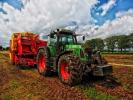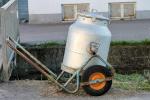H2020 Nutri2Cycle Project: Transition to more carbon- and nutrient-efficient agriculture in Europe
- Type Project
- Status Filled
- Execution 2018 -2023
- Assigned Budget 6.850.050,5 €
- Scope Europeo
- Main source of financing Horizon 2020
- Project website Nutri2Cycle
NUTRI2CYCLE will use an integrated approach to facilitate the transition from the current (suboptimal) nutrient management system in European agriculture to the next generation of agronomic practices characterized by improved nutrient and organic carbon recycling. The project builds on previous national and European projects, in which the consortium members actively participated.
The fundamental principle is that nutrient use efficiency can be significantly improved by integrating techniques and systems into the farm that allow for better reconnection between:
- The flows provided by livestock.
- The needs of plant production. At the same time, this reconnection will contribute to a better return of carbon to the soil and the reduction of GHGs through emissions avoidance, which can optionally be combined with energy production for self-consumption on the farm.
NUTRI2CYCLE aims to:
- Evaluate nutrient mass fluxes, organic carbon, and GHG footprint.
- Provide an evaluation framework (toolbox) to assess the potential impact of proposed innovations.
- Actively support the concepts, techniques and scenarios proposed in the EIP Operational Groups.
- Optimize these scenarios (developed within the consortium) using the toolbox.
- Showcase the most promising developments through prototypes and demonstrations.
Finally, using the experience gained at the local/regional level, NUTRI2CYCLE will develop strategic scenarios to identify the impact of these innovations at the European level. NUTRI2CYCLE brings together the extensive experience of leading experts in the field of nutrient cycling. This collaboration originates from the EIP Focus Group on Nutrient Recycling, which interacts closely with the EIP Operational Groups in individual EU Member States. Improved nutrient management involving all actors in the value chain, as envisioned by NUTRI2CYCLE, will significantly increase the recycling rate of C, N, and P and improve the overall sustainability and innovation capacity of European agricultural systems.
Toward a more carbon- and nutrient-efficient agricultural sector By addressing nutrient imbalances in the agricultural sector, researchers are helping to reduce greenhouse gas emissions and reduce soil degradation. European agriculture is often characterized by nutrient imbalances, where excess nutrients can negatively impact the environment.
“The current agricultural sector puts a huge strain on primary nutrients and energy, leading to deficiencies in the nitrogen, phosphorus, and carbon cycles, and creating environmental and economic challenges for the EU food supply,” says Erik Meers, professor at Ghent University and coordinator of the Nutri2Cycle (Transition to More Carbon- and Nutrient-Efficient Agriculture in Europe) project. “After use, these nutrients are simply discarded, a practice that can have a negative impact on soil productivity, food security, and the environment,” adds Çaşrı Akyol, a postdoctoral project manager at Ghent University. With support from the EU-funded Nutri2Cycle project, Ghent University is leading an effort to close the nutrient cycle. “Addressing existing deficiencies in nutrient flow in Europe will help decrease greenhouse gas emissions, reduce soil degradation, and make the EU more energy and nutrient independent,” explains Meers. Returning carbon to the soil To begin, the researchers analyzed nutrient flows and management techniques from several farms across Europe.
They also defined indicators to monitor and demonstrate the environmental benefits of more efficient, closed nutrient cycles. Building on this work, the project established 14 innovative pilot cases, so-called lighthouse demos, to test the integration of various on-farm techniques that could help move European agriculture toward a more sustainable future. For example, by creating a better connection between livestock design, crop flows, and crop production, the researchers were able to help farmers sequester carbon in the soil.
"Nitrogen and phosphorus recovery on farms can be significantly improved by creating better synergies between animal husbandry and crop production and by integrating the use of agricultural residues such as anaerobic digestion," says Akyol. "These improvements will facilitate the return of carbon to the soil and reduce greenhouse gas emissions, which could be combined with energy production for on-farm consumption," notes Meers. Addressing the Challenge of Food Security To put these concepts into practice, the project established national working groups in each of the 12 partner countries. These groups were tasked with translating project results into the local context and language. Led by Ghent University, the group also works to assess legislative barriers that impede the implementation of the project's most promising solutions and advises the European Commission on policy recommendations. Recently, the European Commission invited the group to discuss how research and innovation can contribute to addressing the challenge of food security.
“By using the right amount of nitrogen where plants need it most, bio-based circular fertilizers can help mitigate nutrient loss, boost crop productivity, and reduce farming costs,” says Meers. Market-Ready Techniques Nutri2Cycle successfully developed innovative, market-ready techniques and practices in nutrient recovery and recycling. In fact, as of March 2023, the project had published articles in 38 Science Citation Index Expanded (SCIE) journals. “We also provided evidence-based, farm-ready solutions for better nutrient management, and translated these into practical policy recommendations,” concludes Akyol. Following the success of the Nutri2Cycle project, researchers have already launched several new EU-funded projects, such as NutriBudget and Novafert, both focusing on activities related to nutrient recovery and recycling.
- UNIVERSITEIT GENT (UGent)






